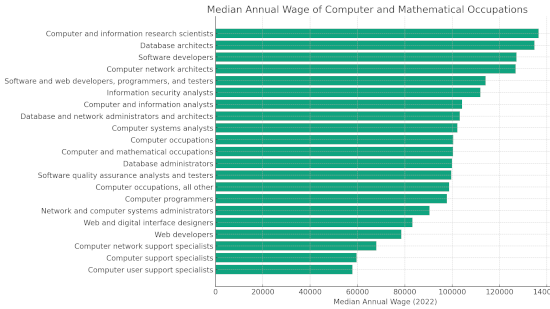Future in Code: Unleash Your Potential in Computer Science
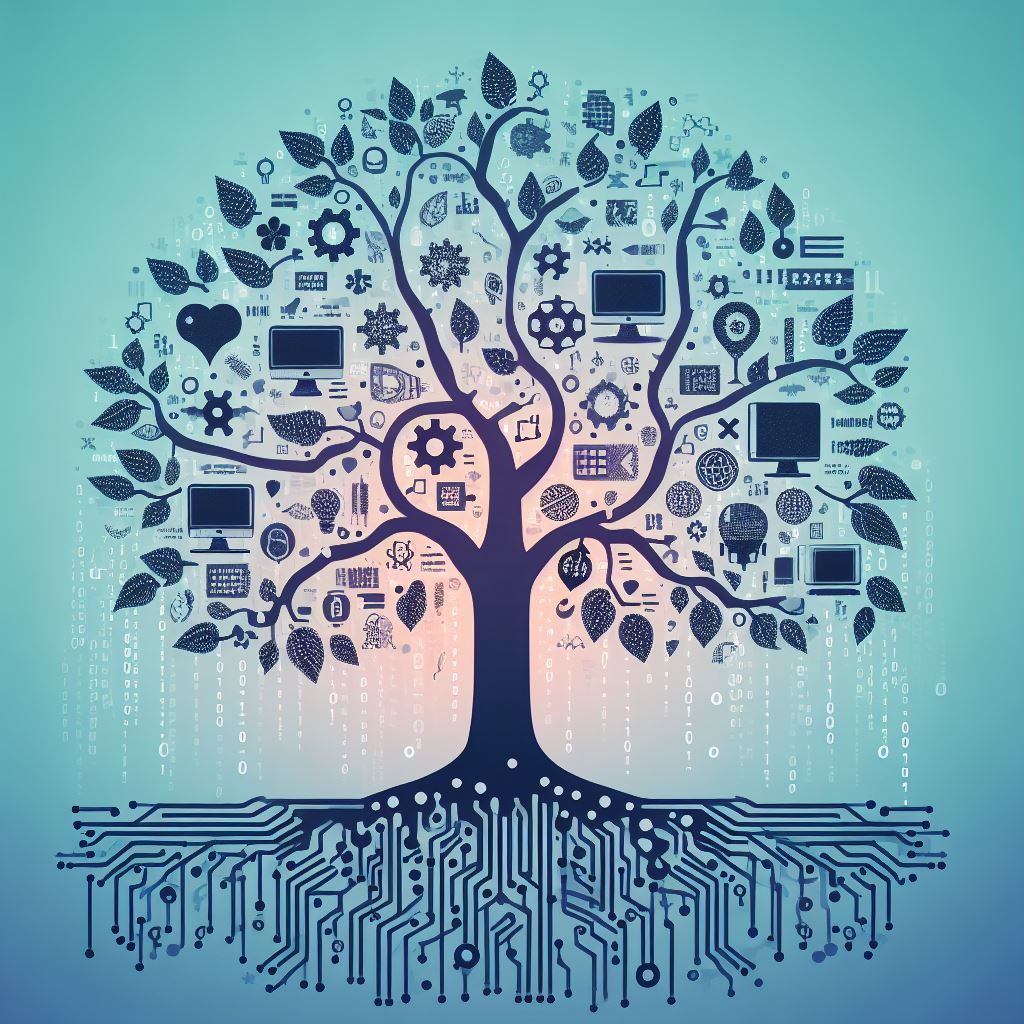
Embark on a Future-Proof Career in Computer Science! With technology rapidly evolving, a degree in Computer Science offers a gateway to some of the most exciting and in-demand careers in the world today.
Join the Vanguard of Innovation: In 2021, 5.7% of all bachelor’s degrees and 10.13% of STEM bachelor's degrees were in Computer Science, reflecting its growing significance in the academic landscape.
Step into a World of Opportunities: The field of Computer Science is projected to create 888,400 new jobs between 2022-2032, making up 19% of all new positions. Be part of this exciting growth trajectory.
Leading the STEM Revolution: A staggering 23% of all new STEM jobs are expected to be in computing by 2032. Your CS degree places you at the heart of this revolution. Be at the Forefront of Change: From accounting for 3.5% of the workforce in 2022 to an anticipated 3.9% in 2032, Computer Science professionals are becoming increasingly integral in every industry.
Shape Your Future Today: Enroll in our Computer Science program and turn your passion for technology into a thriving career. Join us in driving innovation and solving the challenges of tomorrow.
Projections (2022-2032):
- New computing jobs = 888,400 jobs.
- Computer Science degrees will account for 19.04% of new jobs.
- Computer Science degrees made up 5.7% of all bachelor degrees in 2021.
- 23% of new jobs in STEM are projected to be in Computing.
Our School of Computing Projections (2022-2032) are based upon:
- Bureau of Labor Statistics Employment Projections (Table 1.2).
- National Center for Education Statistics (NCES) IPEDS Completions Survey.
How Much Do Computer Science Jobs Pay?
Source: Bureau of Labor Statistics Employment Projections (Table 1.7)
The job market for computer science majors is expanding rapidly, with several areas standing out due to high demand and competitive salaries. Here are some of the fastest-growing areas:
-
Software Development: This field is consistently in demand. Software developers are needed in nearly every industry, from tech companies to financial services, healthcare, and beyond. They design, develop, and maintain software systems and applications.
-
Data Science and Big Data: With the surge in data generation, there's a growing need for professionals who can analyze, interpret, and derive insights from large datasets. Data scientists and big data analysts are highly sought after for their ability to use statistical methods and machine learning techniques.
-
Artificial Intelligence (AI) and Machine Learning (ML): These technologies are at the forefront of innovation. Professionals in AI and ML are needed to develop intelligent systems and algorithms that can learn, predict, and make decisions.
-
Cybersecurity: With increasing digital threats, cybersecurity experts are crucial for protecting sensitive data and ensuring the security of information systems. This field includes roles like security analysts, ethical hackers, and security architects.
-
Cloud Computing: As businesses shift to cloud-based solutions, there's a growing demand for professionals skilled in cloud technology, such as cloud architects, engineers, and developers.
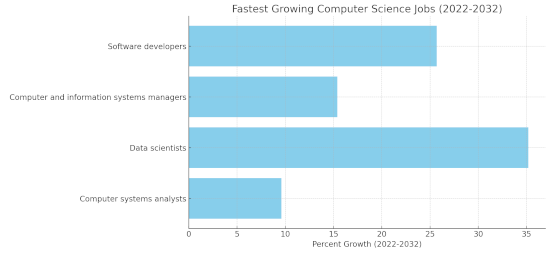
Source: Bureau of Labor Statistics Employment Projections (Table 1.4)
Is it worth it to learn computer science?
A computer science education offers numerous valuable benefits, both in terms of career opportunities and skill development. Here are some key advantages:
-
Foundation in Problem-Solving and Critical Thinking: Computer science education teaches systematic and logical thinking. It hones problem-solving skills, enabling students to tackle complex issues methodically and creatively.
-
Highly Marketable Skills: Skills learned in computer science, such as programming, data analysis, and system design, are in high demand across various industries. This versatility makes computer science graduates highly marketable.
-
Preparation for a Digital Future: As technology continues to advance, having a solid understanding of computer science principles prepares individuals to adapt and contribute to future technological developments.
-
Broad Career Opportunities: Computer science graduates can pursue a wide array of careers, including software development, data science, cybersecurity, AI and machine learning, and more. This field allows specialization in numerous cutting-edge areas.
-
Competitive Salaries: Jobs in computer science are among the highest paying in the world. The demand for skilled professionals often leads to lucrative salary packages.
-
Innovation and Creativity: Computer science education encourages innovation and creativity, as it often involves designing and implementing new software, algorithms, and computing solutions.
-
Interdisciplinary Opportunities: Computer science intersects with many fields like healthcare, finance, education, and entertainment, offering opportunities to work in diverse environments and projects.
-
Global Opportunities: The skills acquired are globally relevant and in demand, allowing for international career opportunities and the potential for remote work in many sectors.
-
Continuous Learning and Adaptation: The field is ever-evolving, prompting continuous learning and keeping professionals engaged with new technologies and methodologies.
-
Impactful Work: Computer science professionals often work on projects that have significant impacts on society, from improving healthcare systems to enhancing educational tools and advancing environmental protection technologies.
In summary, a computer science education provides a blend of theoretical knowledge and practical skills that are crucial for navigating and contributing to the modern digital landscape. It opens doors to diverse, rewarding, and impactful careers.
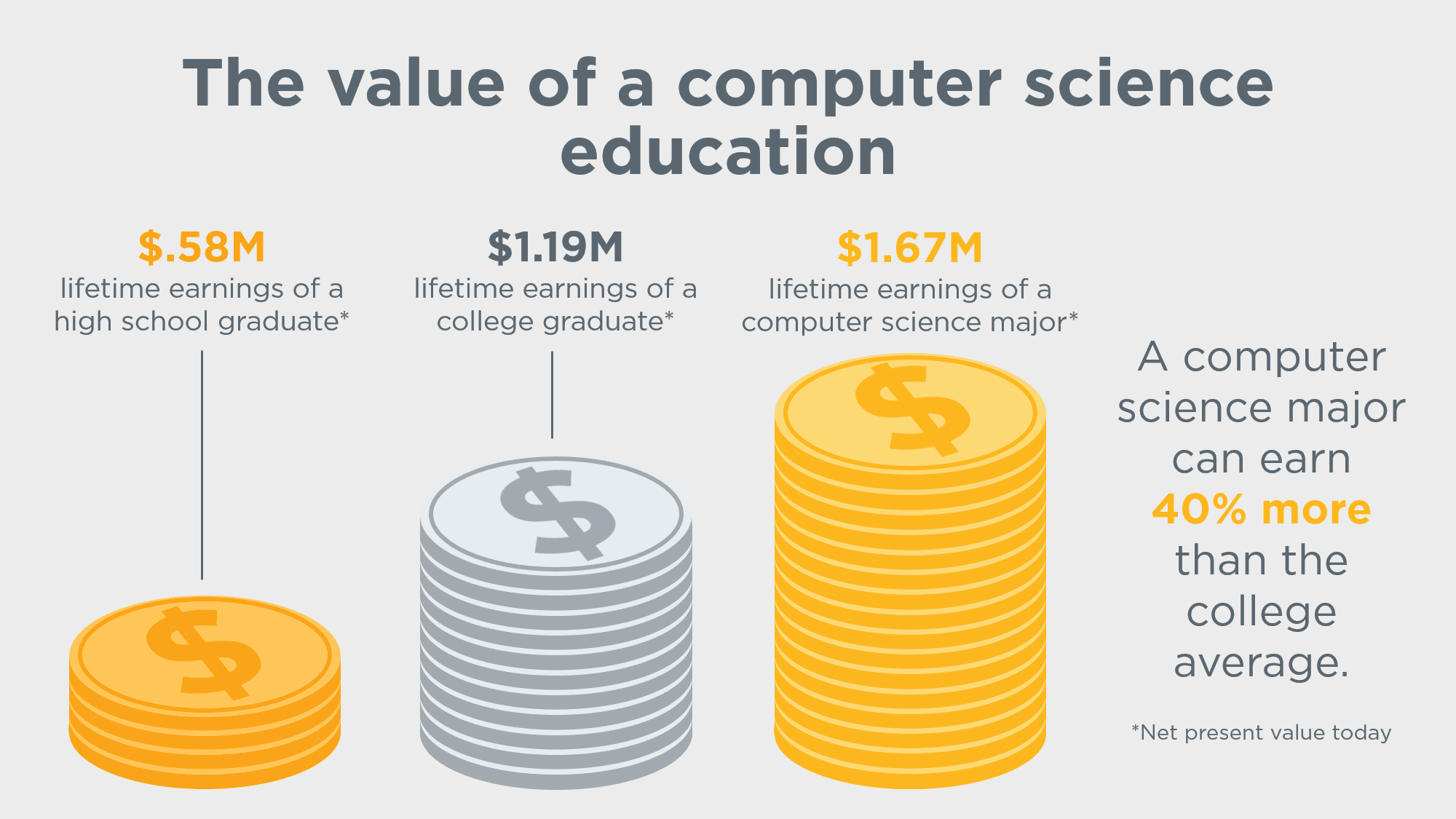
Source: The Hamilton Project (Brookings)
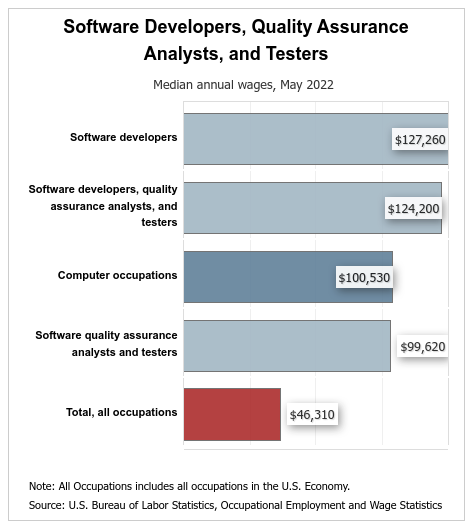
In May 2022, software developers had a median annual salary of $127,260. This median figure means that half of the professionals in this field earned more, and half earned less. The bottom 10% of earners made below $71,280, while the top 10% surpassed $198,100 in earnings.
For software quality assurance analysts and testers, the median yearly wage was $99,620 during the same period. Those in the lower 10% earned under $55,510, whereas the upper 10% exceeded $159,740 in income.
The median annual salaries for software developers varied by industry in May 2022, with the following being the top-paying sectors:
- Software Publishers: $134,430
- Manufacturing: $132,130
- Finance and Insurance: $128,960
- Management of Companies and Enterprises: $127,880
- Computer Systems Design and Related Services: $112,510
Similarly, the median annual wages for software quality assurance analysts and testers also differed by industry:
- Manufacturing: $105,280
- Software Publishers: $101,820
- Finance and Insurance: $97,350
- Computer Systems Design and Related Services: $96,880
- Administrative and Support Services: $93,560
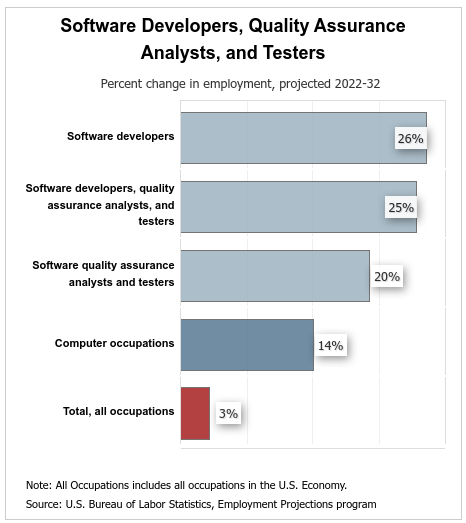
Employment Projections for Software Developers and Related Roles (2022-32)
In the field of software development, quality assurance analysts, and testers, a notable employment growth is expected:
- Software Developers: Projected growth of 26%
- Combined Roles (Software Developers, QA Analysts, Testers): 25% growth
- Software Quality Assurance Analysts and Testers: 20% increase
- General Computer Occupations: 14% growth
- Overall, across All Occupations: 3% increase
It's important to note that "All Occupations" encompasses every job type within the U.S. economy, as per the U.S. Bureau of Labor Statistics and its Employment Projections program.
From 2022 to 2032, the overall employment in these software-related roles is anticipated to rise by 25%, significantly outpacing the average growth rate for all job types. Annually, about 153,900 job openings are expected in these fields. A large portion of these openings will likely arise from the need to fill roles vacated by individuals moving to other professions or leaving the workforce, including retirement.
Key Drivers of Employment Growth
- Increased Demand for Developers: The growing need for software development in areas like AI, IoT, robotics, and other automated technologies is a primary driver.
- Enhanced Focus on Cybersecurity: Organizations are expected to invest more in securing their electronic networks and infrastructure, spurring demand for developers specialized in security software and QA analysts and testers focused on software testing.
- Expansion in Software Use: As more products incorporate software, from consumer electronics to IoT devices and electric vehicles, new opportunities are emerging for professionals in these areas.

